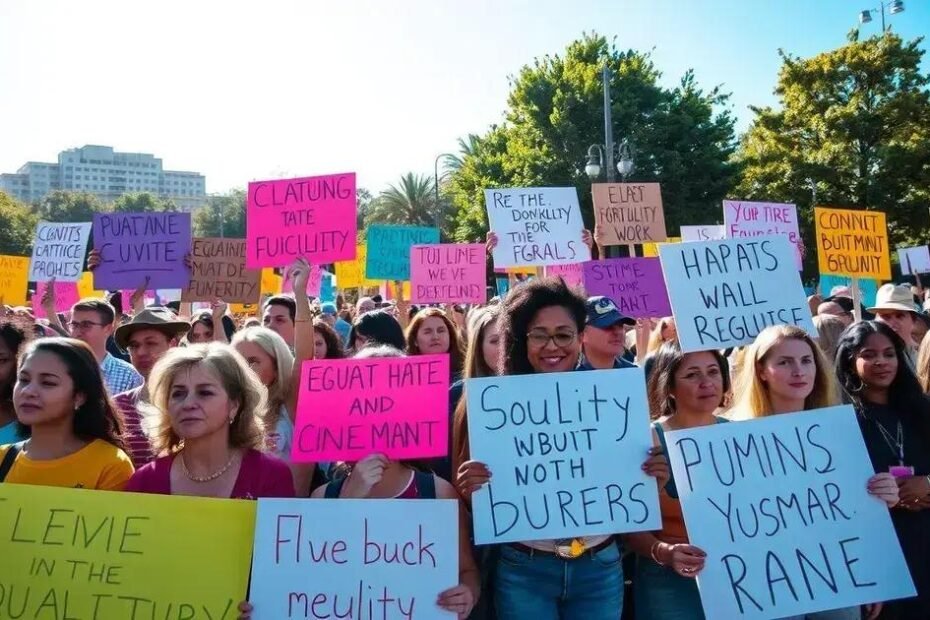Religious communities leading social justice protests address critical issues by mobilizing members, providing support services, and advocating for change, significantly impacting local and global humanitarian efforts.
Religious communities leading social justice protests are at the forefront of advocating for change. Their voices resonate in calls for equality and justice, inspiring many to take a stand. Have you ever wondered how faith can unite people for a common cause?
The role of faith in social activism
The role of faith in social activism is a powerful theme that resonates across various communities. Many individuals find that their religious beliefs inspire them to take action, advocating for social justice and equality. Through faith, people often discover a united purpose that fuels their commitment to change.
Faith-Based Organizations as Catalysts
Religious communities often mobilize to address social issues. For instance, organizations like churches and mosques engage in initiatives that tackle poverty, promote education, and fight discrimination. This community-driven effort fosters an environment where individuals feel empowered to advocate for justice.
- Collaboration with other social groups
- Organizing community service events
- Raising awareness through educational programs
Moreover, faith can strengthen the resolve of activists. When congregations come together, they create a sense of belonging that motivates individuals to persist, even in the face of adversity. For many, the teachings of their faith encourage them to embody compassion, urging them to stand for the marginalized.
Examples of Faith in Action
Various movements demonstrate how faith plays a role in social activism. For example, during the Civil Rights Movement, many religious leaders used their platforms to advocate for equality. Figures like Martin Luther King Jr. highlighted the importance of faith in driving the movement forward, illustrating that spiritual conviction can lead to significant social change.
- Participation in protests and marches
- Interfaith dialogues to promote understanding
- Community-based support for social causes
Furthermore, faith communities often provide crucial resources for those in need, such as food banks and shelter services. This hands-on approach to helping others reflects the core values of many religions, emphasizing service and love for one’s neighbor.
In conclusion, faith is integral to social activism, as it provides both motivation and community support. By coming together, religious groups can drive meaningful social change, exemplifying the transformative power of united beliefs.
Key movements led by religious organizations
Key movements led by religious organizations have shaped social justice efforts throughout history. These movements often arise from a strong desire to align moral beliefs with action in the world. Religious organizations mobilize communities, bringing people together to advocate for change on various issues.
The Civil Rights Movement
One of the most notable examples is the Civil Rights Movement in the United States. Religious leaders, like Martin Luther King Jr., emphasized the role of faith in the struggle for racial equality. Through nonviolent protests and marches, these leaders united communities under the banner of justice.
- Vision of equality for all individuals
- Mobilization of large groups for peaceful protests
- Emphasis on love and forgiveness
Similarly, churches became safe havens for activists, providing resources and support. This collaboration between faith and social action is a testament to the enduring power of belief.
Interfaith Initiatives
Another significant movement is the growth of interfaith initiatives aimed at addressing global issues. These programs bring together diverse religious groups to tackle challenges such as poverty, climate change, and human rights violations. When different faiths unite, they harness a collective strength that can inspire profound change.
- Joint efforts to provide disaster relief
- Dialogues on social justice issues
- Collaborative community service projects
These initiatives demonstrate how shared values can foster understanding and cooperation among varied traditions. When religious organizations work in tandem, their impact on social issues is often magnified.
Additionally, organizations like the World Council of Churches promote peace and reconciliation efforts around the globe. Their focus on dialogue helps bridge divides, creating pathways for collaboration in complex situations.
In summary, religious organizations have played a crucial role in key movements for social justice. Their ability to inspire action, unite communities, and advocate for the marginalized showcases the importance of faith in addressing societal challenges.
Challenges faced by religious communities

Challenges faced by religious communities are numerous and complex. As they strive for social justice, these communities encounter various hurdles that can limit their effectiveness and outreach. Understanding these challenges is essential to appreciate the resilience shown by these organizations.
Internal Conflicts
One major challenge is the presence of internal conflicts within religious groups. Disagreements on social issues can lead to division and weaken their collective voice. Members may hold different views on important topics such as immigration, climate change, or gender equality.
- Differences in interpretation of religious texts
- Impact of cultural backgrounds on beliefs
- Generational gaps in understanding
These conflicts can hinder the ability to present a united front, which is vital for effective advocacy and community support.
Societal Opposition
Another significant challenge arises from societal opposition. Religious communities often face criticism or backlash when taking a stand on controversial issues. This can come from both outside and within the community, making it difficult to engage people effectively.
- Negative stereotypes about religious groups
- Pressures from secular groups
- Media portrayal of religious activism
These pressures can deter participation and diminish the impact of campaigns. Many individuals fear being judged for their beliefs or actions, leading to a reluctance to engage in social activism.
Additionally, funding can pose challenges for these organizations. Many rely on donations and grants to support their programs, but economic fluctuations can affect their financial stability. This limitation restricts the scope of community engagement efforts, making it harder to address pressing social issues.
As religious communities continue to navigate these challenges, they often develop innovative strategies to remain effective. By fostering dialogue and seeking common ground, they can overcome some of the internal conflicts they face. Furthermore, community outreach and education can help combat societal opposition, leading to a broader understanding of their goals.
Impact on local and global issues
Impact on local and global issues is significant when it comes to religious communities engaging in social justice. These communities not only address immediate needs in their surroundings but also contribute to wider movements that resonate on a global scale. Their influence can be observed in various areas, including humanitarian efforts, peacebuilding, and advocacy for human rights.
Local Community Engagement
Many religious organizations focus on local community issues. They often provide essential services, such as food banks, shelter, and educational programs. By addressing these immediate needs, they foster a sense of hope and empowerment among individuals.
- Supporting unhoused populations
- Facilitating after-school programs for children
- Providing healthcare services
As these communities mobilize resources, they help alleviate suffering and build resilience. This grassroots approach lays a strong foundation for individuals to advocate for long-term change.
Global Advocacy and Peacebuilding
On a larger scale, religious communities often engage in global advocacy. Many faith-based organizations participate in movements aimed at promoting peace and resolving conflicts around the world. They leverage their influence to spread messages of tolerance, encouraging dialogue and understanding between differing cultures and beliefs.
- Engagement in international humanitarian missions
- Promotion of interfaith dialogue
- Advocacy for policy changes on human rights
This commitment to global issues enhances their ability to serve as mediators and peacemakers. Their efforts can bridge divides and promote cooperation in areas experiencing strife.
Additionally, religious communities often raise awareness about global injustices, such as climate change and poverty. They encourage their members to participate in advocacy by writing letters, funding initiatives, and joining campaigns that resonate on both local and global levels.
Through their dedicated work, these communities not only uplift individuals but also inspire collective action, ultimately contributing to a more just and equitable society around the world.
How to get involved with these communities
How to get involved with these communities is a question many people ask when considering ways to support social justice efforts. Engaging with religious communities can be a rewarding experience that fosters meaningful connections and impactful change.
Finding Local Organizations
To get started, look for local religious organizations in your area. Many of these groups are actively engaged in community service and advocacy. Attend services and community events to learn more about their missions and how you can contribute.
- Check local church or temple bulletins for events
- Visit websites of nearby religious groups
- Join community boards or social media pages
This will help you connect with like-minded individuals who share a passion for social justice.
Volunteering Opportunities
Once you’ve identified a community, inquire about volunteer opportunities. Many religious organizations rely on volunteers to support their social initiatives. You might find chances to assist in programs such as food drives, tutoring, or outreach services.
- Participate in community clean-up days
- Help organize fundraising events
- Support youth or educational programs
By volunteering your time, you not only aid the organization but also deepen your understanding of the issues they address.
It’s also important to educate yourself about the social justice causes these communities champion. Read books, attend workshops, and engage in discussions to broaden your perspective. Understanding the challenges faced by marginalized groups will enable you to advocate more effectively.
Moreover, consider participating in interfaith events that foster dialogue and collaboration between different religious communities. These gatherings often promote inclusivity and understanding, allowing you to build connections that bridge gaps between cultures.
Finally, financial support is crucial for many religious organizations. If you are able, consider donating to initiatives that resonate with you. Your contributions can help fund programs that provide essential services or work toward systemic change.
In conclusion, religious communities play a vital role in leading social justice protests. Through their unwavering commitment to equality and service, they inspire others to take action. While facing various challenges, these organizations continue to make a significant impact on both local and global issues. Engaging with these communities not only strengthens support for social causes but also helps foster understanding and compassion among diverse groups. By getting involved, individuals can contribute to the broader movement for justice and equality for all.
FAQ – Frequently Asked Questions about Religious Communities and Social Justice
How can I get involved with local religious communities?
You can attend services, participate in community events, and inquire about volunteering opportunities. This helps you connect with like-minded individuals.
What types of volunteer work can I do?
Volunteering can include assisting in food drives, mentoring programs, or community clean-up events organized by religious groups.
Why is understanding social justice issues important?
Understanding social justice issues helps individuals engage more effectively and advocate for change, fostering empathy and informed discussions.
How can interfaith events contribute to social justice?
Interfaith events promote dialogue and understanding across different religious backgrounds, encouraging collaboration in addressing social issues.

